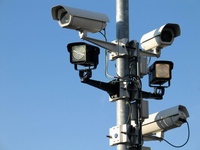Scary IT: Ministry of suspicious walks

Ever walked down a deserted street at night and had that eery feeling you're being watched? If you live in London, there's every chance you are. The UK has more CCTV cameras (5 million) per head of population (60 million) than any other nation. It's estimated that a Londoner going about their everyday business and leisure passes under the gaze of more than 300 cameras in an average day. In a report presented at a London conference today, the UK government's information commissioner says Britain is now a "surveillance society" — and that the country has sleep-walked into this state unawares.

Most CCTV operators are far too busy looking out for people who break the law, anyhow. CCTV cameras operated by London's local government play a major role these days in the war on parking contraventions. Offenders caught out by CCTV surveillance and sent fines in the mail during the past year have included Christmas Day volunteers at a charity lunch who started the day by unloading provisions in a no-waiting zone; a learner driver who remained stationary too long while practising parking manoeuvres; and a disabled man who pulled over briefly to adjust an artificial limb after it had worked loose while he was driving.
Meanwhile in the northern town of Middlesbrough CCTV cameras have been fitted with loudspeakers so that litter louts, sidewalk cyclists and street drinkers can be brought up short with disembodied verbal warnings.
Unfortunately some citizens are beginning to feel that CCTV is proving far more effective at harvesting parking fines from the law-abiding majority than it is at preventing and detecting more serious criminal activity. Perhaps that's why, according to an article in last month's New Statesman magazine, the latest cameras aim to help operators spot potential criminals with digital analysis of what they're seeing on their monitors:
"In 2003, 'smart' software called Intelligence Pedestrian Surveillance was introduced. This analyses clusters and movements of pixels in CCTV footage in search of 'behavioural oddities'.
"British scientists, backed by the Ministry of Defence and a £500,000 government grant, are developing cameras with 'gait recognition'. These will recognise whether people are walking suspiciously or strangely, and alert a human operator. Think of it as the Ministry of Unfunny Walks."
The reference to John Cleese's portrayal of a civil servant in charge of doling out grants to people with bizarre gaits brings out the absurdity of the notion. But while Monty Python's Ministry of Silly Walks rightly satirized the 1970s government tendency to waste money on ridiculous projects, the current investment in detecting suspicious walks has a more sinister edge. It betrays an unjustified confidence in the power of technology to substitute for human judgment and on-the-spot social interaction (in much the same way, come to that, as the original investment in CCTV cameras). If operators are already unable to identify suspicious behavior for themselves, how much less will they be able to judge whether or not the computer has matched a false positive?
The common refrain of apologists for the surveillance state is, "if you have nothing to hide, you have nothing to worry about." But what if you happen to walk or dress or behave in a way that, through no fault of your own, has been designated as suspicious by a 26-year-old programmer's software algorithm that failed to take into account exceptions like you? Once you unwittingly stray into the twilight zone of suspicious behavior, your reputation and even your life can be at risk. Getting on the wrong side of the law is scary enough. Getting labeled as a criminal by poorly implemented technology is even scarier.